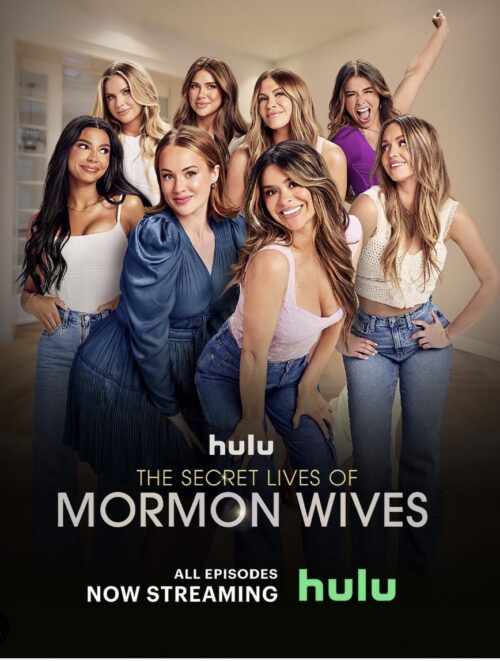After I was asked to co-host an AMA on Reddit’s forum about Secret Lives of Mormon Wives, I mentioned to a casual acquaintance that one big question the community had about the show’s stars was whether—with their boozing, coffee-drinking, garment-eschewing, sex-outside-marriage ways—they were really Mormon.
“Well OF COURSE they’re Mormon!” this woman exclaimed, as if her assertion settled the question. “They were born to Mormon parents who raised them in the faith.”
Where to start?
I too was born to Mormon parents and raised in the Church, but call me Mormon and this quiet little wallflower will jump down your throat. Once, at a company dinner, I mentioned that, having been raised Mormon, I hadn’t tasted alcohol until my 20s. My boss’s boss’s boss, a British Knight, happened to overhear and was eager to show his knowledge of Americana.
“Ah,” he said triumphantly, “you’re a Jack Mormon.”
“I am not a Jack Mormon. I’m an ex-Mormon.” My reply was so loud that my end of the table hushed.
Then I calmed down and explained that I’m not someone who is ignoring prohibitions against swearing, coffee, tea, alcohol, etc. Instead, I have explicitly rejected them, along with prescriptions for what a family is, what it takes to be a good person, and how obedience is a virtue above all others.
I’m not alone here. Witness the older Hulu series, Mormon No More, chronicling two LDS moms falling in love and leaving the Church. Or rock star David Archuleta’s exuberant “I’m an ex-Mormon” Facebook post celebrating new freedoms. The journey from the label is traumatic, but the destination is joyful.
And yet, at the Sunstone Conference this year board member Scott Barrett proclaimed that the true count of Mormons should include anyone who felt “culturally Mormon.” I resonated, glad to be recognized. I too know what home teachers and Fast Sundays and funeral potatoes are. I too understand the visceral fear of disappointing family and God. I suppose it says something about me that I’d flown to Salt Lake City in the first place.
But cultural Mormon feels too shallow somehow . ‘Mormon community’ implies more cohesion than actually exists; ‘Mormon penumbra’ captures a sense of it. (That I can imagine my place in the shadowy penumbra as Outer Darkness and laugh is a clear signal of ex-Mormon recovery.)
So what about the Tiktok stars? Just calling themselves “Mormon” is an act of self-assertion, given centenarian President Nelson’s oddball injunction to use the full name of the Church. And by flaunting the behavioral standards without rejecting the Church, these women loosen the control that the Church has over its members.
I think, though, this lets the Brethren off the hook. At their most outspoken, members of MomTok blame “culture,” not “doctrine” or leadership. That lays accountability on Church members rather than leaders.
Nonetheless, all the conversations about whether these women can be counted as real Mormons makes clear that not everyone is living Mormon the same way. So if someone wears garments or drinks alcohol occasionally and calls themselves Mormon, who am I to judge?
PS1: Girls Camp podcast interviews Hulu star Jessi Ngatikaura on why she identifies as an exMormon here. And Mormon Stories dissects Church status here.
PS2: First Reddit AMA on Secret Lives of Mormon Wives is Oct 3, with another definitely planned for Oct 17th. Delighted and surprised to be participating along with super-insightful people.

So the AMA hasn’t happened yet? Do you know when it will be?
I like that we can define how our connection with Mormonism affects our identities, whether we’re more comfortable with exmo, postmo, cultural Mormon, or whatever.
I’ve never cared for the CoJCoL-dS thinking its leaders can police who gets to identify as “Mormon”. It’s especially funny now that they’ve decided that “Mormon” is a slur.
YES! I just updated the post to say that it is Oct 3.
And yes, the god that the Mormon prophets are tapping into seems very capricious about branding, with a big media “I’m a Mormon” campaign one decade and Mormon as a slur another.
There’s probably no simple term that explains our individual location in the penumbra (I do love that term!).
My former membership in the LDS church usually comes up indirectly. Perhaps someone has overheard me speaking Italian to a tourist at work. “How do you know Italian?”
“I lived in Italy for a couple of years.”
“Oh! Why?”
“I was a door-to-door salesman.”
“Really? What were you selling?”
“Mormonism. But my husband and I were both excommunicated and are happily atheist these days.”
The word “ex-Mormon” might not even come up at all. If the subject has been broached a different way, it might. But given the politics of my Mormon family members and former missionary colleagues, I never feel comfortable associating myself at all with my previous membership without making it clear I’m definitely, absolutely, no way still a Mormon.
Not sure I can make it through the actual “Secret Lives” series, but I’m very interested in your take on it, Monya!